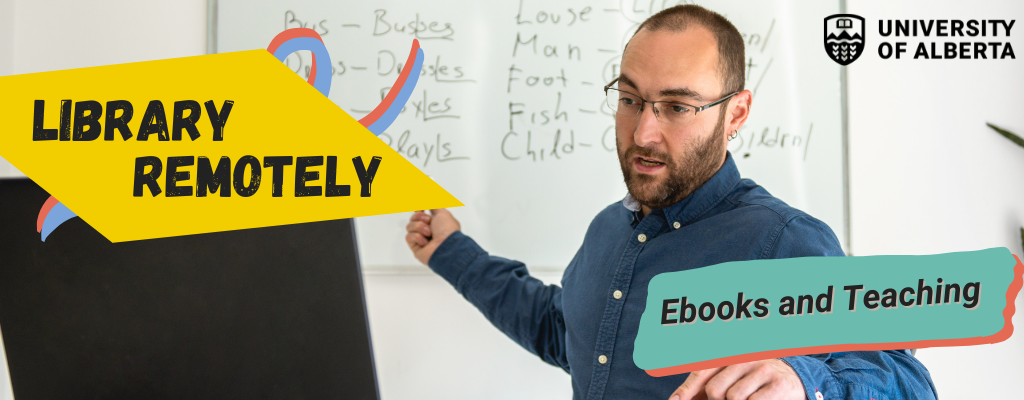
I’m a librarian in the Library’s Collection Strategies Unit (CSU), and a lecturer in the School of Library and Information Studies. I’d like to offer some things to consider around ebooks. As instructors work to adapt courses for a mainly-online Fall term, Library staff support this work, in part by fielding questions about all sorts of publications. This post shares key information about ebooks in particular, ie., books existing in a digital format.
We gladly accept requests for ebooks not currently in the Library collection. Please use the Recommend a Purchase form. And please specify that your request relates to a course — contextual details help us prioritise.
The main underlying fact that will determine whether or not we can acquire an ebook is that publishers decide whether or not, and how, their books exist as ebooks. Publishers determine the availability of ebooks, as well as options for use, such as downloading, printing, and simultaneous user limits. This means that the Library may or may not be able to acquire a desired ebook. Our collection contains nearly two million ebooks, but there are many books that we can’t collect in ebook form. Here are some examples illustrating why.
- Print books may not have been published as ebooks.
- E.g., the MLA Handbook; Kathy Charmaz’s Constructing Grounded Theory.
- Books may be published as ebooks that cannot be collected by libraries.
- E.g., the Publication Manual of the American Psychological Association. The APA Manual is for sale as an ebook only to individual people (via VitalSource and RedShelf), not to libraries.
- E.g., many textbook publishers sell ebooks to individual people, but not to libraries. Please see the University of Guelph Library’s post, “Commercial textbooks present challenges in virtual environment,” for more information.
- E.g., ebooks published for Amazon Kindle.
- Books may be available to some libraries, but not others.
- E.g., N.K. Jemisin’s fantastic new novel The City We Became. This ebook appears to be available from the Edmonton Public Library, but there are currently no options for the University of Alberta Library, as an academic library relying on different vendors, to have this ebook in our collection.
- Ebooks may only be available in large bundles, not as individual books.
- E.g., Learning to Teach Young Children: Theoretical Perspectives and Implications for Teaching, which we’d love to collect as an ebook. Unfortunately the publisher only sells this book to libraries as part of a large collection costing tens of thousands of dollars. See also: Oxford Handbooks.
What about downloading/printing/simultaneous use?
Ebooks in the Library collection offer different options for use. Sometimes it’s possible to download an entire ebook as a single, DRM-free pdf, as with Groups and Symmetry, which is being assigned in Fall as a textbook. Meanwhile, being assigned in another department is The Lotus Sutra, of which only 5% can be downloaded, with at most six people reading at once. We regularly advocate with publishers and vendors for more expansive access, and Library ebooks are becoming less restrictive, overall. However, there are still ebooks for which publishers do not offer unlimited simultaneous use or generous allowances for downloading and printing.
The best way to understand the options for a particular ebook, in addition to asking us, is to explore it, and its surrounding interface and metadata. You may observe how publishers’ platforms (e.g., Cambridge Core, Bloomsbury Collections, Institute of Physics) generally provide unlimited simultaneous use and relatively easy downloading. Aggregator platforms (e.g., ProQuest Ebook Central, EBSCO Ebooks) contain more variability, because they offer ebooks from many different publishers, with different preferences.
I encourage you to double-check with Library staff before assigning an ebook, especially as a core required text. We can clarify an ebook’s options for use. Sometimes we can upgrade to a more expansive level of access. We can suggest ways for students to share an ebook with limited simultaneous use.
And, if a desired ebook is unavailable, we can advise about potential alternatives, including the possibility of finding or creating an Open Educational Resource. I also encourage everyone who writes books to ask your publisher to make your book available to libraries, as an ebook.
The University of Alberta Library has been collecting ebooks for well over a decade. The Library collection, and staff, already support online teaching and learning, and we’ll continue to do so. Ask us any time.
